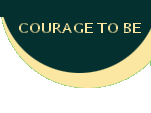COURAGE TO BE
By Uriah J. Fields
It takes courage to be be nobody but yourself, in a world where the
forces of many kinds are constantly at work to make you not you.
"To be or not to be? that is the question" posed in Shakespeare's "Hamlet" Act 3, Scene 1. This is a question that every person is required to answer especially those who choose "to be."
Once a person's answer is "to be" the most vital thing needed to make that a lived reality is possessing courage. Indeed it takes courage to be.
Courage is the ability and availability to act rightly in the face of opposition. It is the quality of mind or spirit - soul power - that enables a person to face and interface difficulty, danger, pain, etc., without withdrawing or hiding from things feared and apparent danger and to stand inviolate of one's uniqueness and integrity.
Martin Luther King, Jr., (I served as his first civil rights secretary during the Montgomery Bus Boycott) profiles courage in this statement:
The measure of a man is not where he stands
at time of comfort and convenience, but where
he stands at times of challenge and controversy."
The "courage to be" is something more than physical courage. That is one facet of courage, not the most important characteristic. The courage to be can be understood and measured when lived and viewed in the light of this fivefold paradigm below:
1. Courage to be authentic. Each person is unique, possessing a DNA essence that is unmachable with that of any other person. The mission that a person is called to fulfill cannot be fulfilled by any other person. To be authentic a person has to be himself. Not a duplicate or imitation. Honesty is the most fundamental quality of authenticity. That is to say "what is, is." Foremost, this means a person has to be honest with himself. "To be nobody but yourself" is a divine mandate given to every human being.
2. Courage to be productive. Humankind deserves to expand in consciousness and offerings that sustain and enhance Planet Earth, as a result of what each person's gifts, talents, productivity, services and the mystery that surrounds him adds. To be a producer rather than merely a consumer offers insight into understanding this component of courage to be.
3. Courage to create. To create is to be creative and to be creative is to be original. Being creative is something more than being productive, even though the creative person is porductive. Nevertheless, a person may be creative when nobody else is aware of his creative activity. Let it be as Fank Sinatra put it: "I did it my way." That's beautiful, especially when it is your best that is not to be compared with anyone else's productivity.
4. Courage to love. It has been said that "Love is not cheap." Love takes time, love can be painful, love is power. Love just may be the strongest power in the universe. Love begins with self-love, that is loving self. It is only then that a person can engage in loving another person and loving God as he loves himself. A person's courage can be measured by how he responds with or without love to life in its many expressions and manifestations. Ultimately, the courage to love is the availability to love, to give all to love, free of expectations or reciprocity. Love loves.
5. Couage to enjoy. Life is to be enjoyed. It takes courage to enjoy. There are forces constantly trying to limit a person's joy, steal his joy or cause him to have negative emotions. How important is joy? C. S. Lewis puts it this way:
Than to enjoy delight with liberty
What more felicity can fall to creature.
It seems that no law or principle or value is worth a person being involved with or subscribing to - not truth or marriage or fidelity or love or even life itself - unless one may thereby derive enjoyment. John, the beloved disciple of Jesus based the purpose and value of his message on joy. He exclaims:
These things have I spoken to you that
your joy might remain in you and that
your joy might be full. (John 15:11)
By making application of these fivefold components that are also principles in livingness and evaluating his development a person is able to measure the progress and degree of achievement he possesses in the courage to be at any time, not as a goal but as a process which is like unto the abstraction of an endless line or a stream that runs ceaselessly on.
Copyright 2010 by Uriah J. Fields



















































































































































